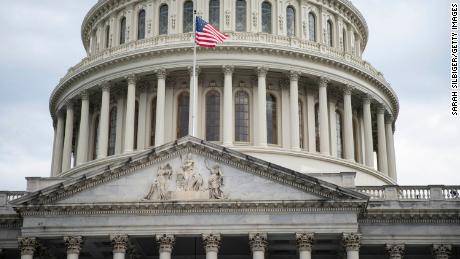Austin and Milley will be joined by the leader of US Central Command, Gen. Frank McKenzie, who played an integral role in facilitating the evacuation from Kabul — an effort that has been the focus of immense bipartisan criticism since the last American military aircraft departed the Afghan capital.
All three officials will undoubtedly face questions about the chaotic nature of the withdrawal, be pressed to explain the Biden administration’s plan for conducting counter-terrorism missions in the country going forward and be called upon to answer for the failures that led to a drone strike killing 10 civilians, including seven children, in Kabul during the final days of the evacuation.
Milley may also be grilled about new reporting in “Peril,” a book by Washington Post reporters Bob Woodward and Robert Costa, which details the military leader’s phone conversations to reassure a nervous Chinese general and his efforts to limit then-President Donald Trump from potentially ordering a dangerous military strike.
Milley’s actions, which were reported by CNN and others earlier this month ahead of the book’s release, spawned sharp criticism from Trump and his allies, including calls for Milley’s resignation and that he be tried for treason.
The hearing before the Senate Armed Services Committee comes after Secretary of State Antony Blinken defended the Biden administration’s withdrawal from Afghanistan and the chaotic evacuation effort during consecutive congressional hearings earlier this month.
The top US diplomat was the first member of the administration to publicly account for the events in Afghanistan before Congress and remains the only senior official to testify on that topic to date — frustrating lawmakers on both sides of the aisle who have sought to lay blame for what unfolded.
That will change Tuesday when lawmakers finally have an opportunity to hear from the top Pentagon officials who oversaw key parts of the withdrawal and are now tasked with preventing Afghanistan from becoming a safe haven for terrorists.
The Biden administration has yet to detail its plan for countering terrorist threats emanating from Afghanistan now that American troops have left the country, though top military and intelligence officials have acknowledged groups like al Qaeda could soon reconstitute there.
Last week, Oklahoma Sen. Jim Inhofe, the top Republican on the committee, formally requested information from the Pentagon related to the August 26 attack on the Kabul Airport that killed 13 US service members; US strikes conducted on August 27 and 29; efforts to evacuate civilians from the country; US military equipment and materiel left behind; and the administration’s future counterterrorism plans.
While the Pentagon has until October 8 to respond to that request, Inhofe’s letter offers a window into the kinds of questions he and other lawmakers may pursue during Tuesday’s hearing.
Inhofe and a group of top Republicans also voiced concerns Monday about the prospect of US-Russian military cooperation on counterterrorism operations in Afghanistan after the Wall Street Journal reported that Milley raised the issue last week during a conversation with his Russian counterpart.
A source with knowledge of the discussion and two others briefed on the matter confirmed to CNN that Milley, at the request of the National Security Council, asked his counterpart to clarify a previous comment made by Russian President Vladimir Putin in which he suggested the two countries could coordinate in this area going forward.
The first source maintained this was not a policy-driven discussion but simply an effort to understand what Putin meant when he raised the possibility of allowing the US access to regional military installations in Central Asian countries during a meeting with Biden earlier this summer, as it was unclear at the time if he was serious.
That said, the source noted that the Biden administration is not going to wait on acquiescence from Russia or any other country to execute its policy in this part of the world. The source also said that it was unclear if Milley received any clarification during his discussion with his Russian counterpart.
Milley’s office did not immediately respond to CNN’s request for comment but he could be pressed on the issue during Tuesday’s hearing.
Meanwhile, McKenzie will likely face questions about the deadly Kabul drone strike last month that killed 10 civilians — including seven children.
McKenzie told reporters earlier this month that the strike was a “mistake” and offered an apology, acknowledging a military investigation determined the vehicle targeted was likely not a threat associated with ISIS-K as previously believed.
While McKenzie stressed that future strikes will likely be held to a higher standard, confirmation of the civilian death toll also provides insight into the obstacles ahead for military and intelligence officials tasked with fulfilling President Joe Biden’s promise to make ISIS-K, the terror group that claimed responsibility for the attack that killed the 13 US troops, “pay” for its deadly suicide attack in Kabul.
Additionally, the Pentagon leaders could be asked about tens of thousands of Afghan refugees who are temporarily being housed at military installations around the US.
Several of those installations are nearing capacity, according to new numbers provided by Northern Command on Monday, raising more questions about where the administration plans to send those who are still trying to flee Afghanistan.








